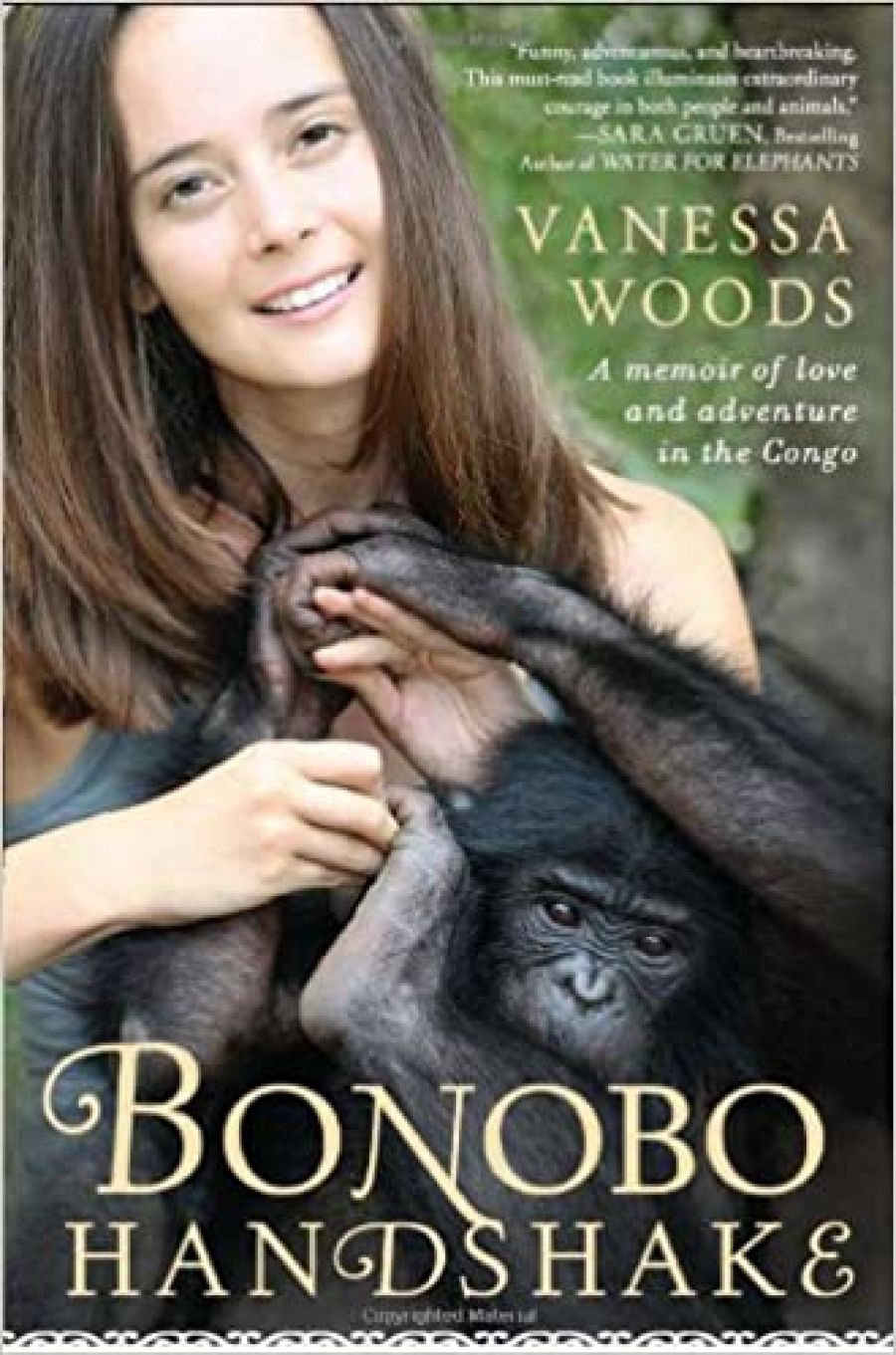
- Free Article: No
- Contents Category: Memoir
- Review Article: Yes
- Online Only: No
- Custom Highlight Text:
Even the name is confusing: think of it as Belgian Congo/Zaire/Congo DRC to avoid confusing it with the Republic of Congo/Congo Brazzaville across the river. Officially, the name is Democratic Republic of Congo – DRC – so you could roll out the usually accurate cliché that any country with ‘Democratic’ in the name definitely isn’t that. In fact, the DRC had an election a few years back which was reasonably democratic and certainly inspired an impressive voter rollout.
- Book 1 Title: Bonobo Handshake
- Book 1 Subtitle: A memoir of love and adventure in the Congo
- Book 1 Biblio: Black Inc., $27.95 pb, 256 pp
- Book 1 Readings Link: booktopia.kh4ffx.net/7j3qY
The name may be bewildering and the history a mystery, but it is quite possible that we are all carrying a little piece of DRC in the form of blood tantalum. Conflict diamonds, glittering in supermodel cleavages, are not the only bloody export to fuel regional wars. Tantalum is a vital ingredient in the semiconductors in our mobile phones and laptop computers. A large slice of the world’s tantalum, extracted from coltan, the ore columbite-tantalite, comes from the troubled eastern region of the DRC. Australia, with Chile, is the other main source of tantalum, but Australian miners find it difficult to compete with the prices offered by DRC warlords.
The curse of natural resource riches is writ large on the DRC. There is no reason why it shouldn’t be prospering, like other big, resource rich countries such as Brazil or Australia; instead, it is still languishing. Which brings us to the bonobos, close relatives of the chimpanzee and, like other large primates in unstable regions of Africa, often victims of the hunger for ‘bushmeat’, a vital food supply when violence has shut down farms and inflated the price of other protein sources. At the Lola ya Bonobo sanctuary, at a former Mobutu retreat outside Kinshasa, the capital of the DRC, orphaned bonobos are cared for, rehabilitated and, one hopes, prepared for a return to the wild.
In her earlier book, It’s Every Monkey for Themselves (2007), Vanessa Woods chased capuchin monkeys through the jungles of Costa Rica. It is her interest in primates that takes her to the DRC. At first her focus is on chimpanzees. Woods studies them intensively because of their close relationship to humans, not just in their DNA, but in their everyday behaviour. Observing the chimpanzee lifestyle, it is easy to conclude: ‘so that’s where the Mafia/hedge fund operators/ sex traffickers/real estate speculators/arms dealers/terrorists developed their instincts.’ Chimpanzees are often not very nice. They can exhibit the worst aspects of human nature, and the death toll from inter-chimpanzee aggression can be statistically worse than the most violence-prone, bottom-of-the-most-liveable-list city you care to name.
And bonobos? Well, they look like slightly smaller chimpanzees, but that is where the similarities end. Bonobos are the political Greens, the 1960s hippies still determined to make love not war. Of course, food is always interesting and offspring are well cared for, but it often seems that love is what it’s all about for bonobos. Woods produces stick-figure illustrations of the assorted positions for sex that she has observed among the bonobos, complete with the missionary position and others with smiley faces, ‘to make it clear that the sex is consensual’. Ms Woods isn’t shy about adducing her own sex life for strictly scientific comparative purposes. When two of the female bonobos engage in some ‘wild, hot sex’, Woods notes that the climax lasts for four seconds – ‘the exact length of my own orgasms’.
The DRC’s chaotic history always plays in the background. Claudine Andre runs the Lola ya Bonobo sanctuary. Her husband recounts one of the ‘grand pillages’, when Mobutu ran out of money to pay his army and suggested they shake down the population instead. When the mob turned up at their house, Victor opened the gates: ‘Welcome, my friends, you can take anything you want! Feel free, help yourselves.’ And they did. Claudine adds, ‘You cannot imagine. They even took the copper wiring from the circuits.’
The orphaned bonobos are not the only victims of the country’s horrific instability. More than one sanctuary employee has a horror story to tell of his collision with rebel groups or invading armies. To make matters worse, when every neighbouring country seemed intent on grabbing its slice of the Congo cake, there were plenty of companies in the West which had no problem bending the rules to get their share of the spoils. Uganda is suddenly exporting large quantities of gold when there is no gold within its borders? We can fix the paperwork. Rwanda’s diamond and coltan exports suddenly skyrocket, even though the country has neither diamonds nor coltan? Let’s not ask difficult questions.
Fortunately, Bonobo Handshake is far more than war and chaos. There is real love for the bonobos from all sides, and when an orphaned bonobo simply melts away, despite all the efforts to keep it alive, it is clear that you can die from a broken heart. But the handshake of the title? That’s just more sex; rubbing her impressively sized clitoris against you seems to be a form of greeting for female bonobos. If chimpanzees are the model for our dog-eat-dog, male-dominated society, the bonobos are the ardent feminists and male bonobos had better learn to behave or suffer the consequences.


Comments powered by CComment